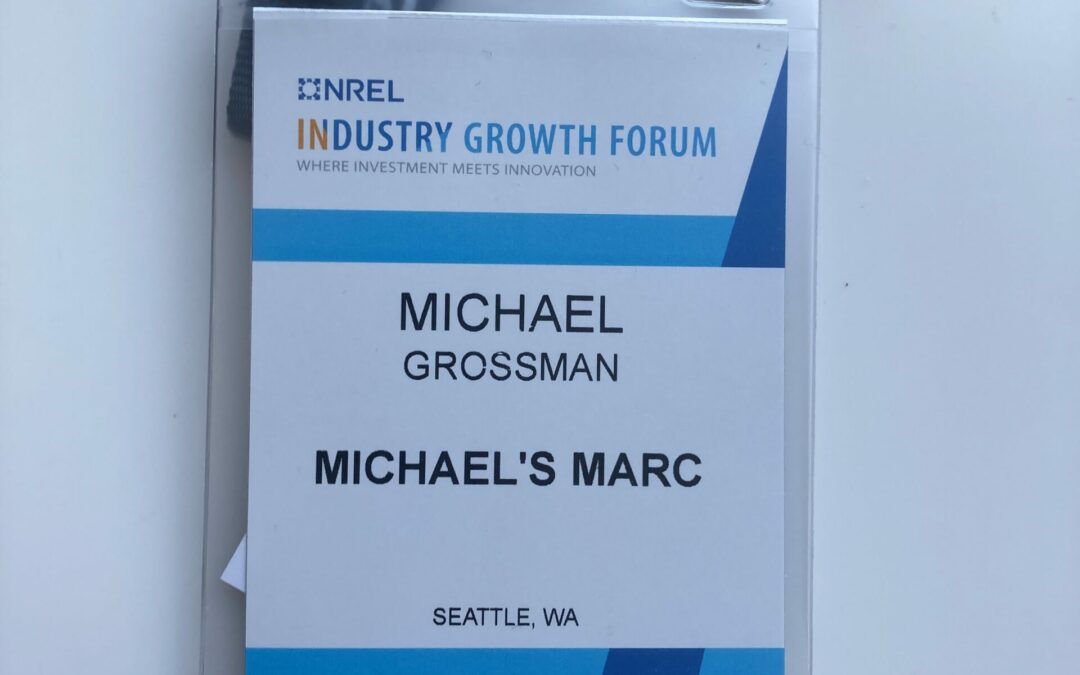The annual gathering of the most promising early-stage cleantech companies at the National Renewable Energy Laboratory’s Industry Growth Forum is a feast of ideas for those who believe we can stave off the worst impacts of climate change.
While history says 90 percent of these startup companies will never live to see profitability, one hopes they all find a way to bend the laws of economics as creatively as they’ve shaped physics and chemistry into unique value propositions.
Most of these companies aren’t yet thinking about marketing strategy or market positioning, so I spent most of my time walking from display table to display table to satisfy my curiosity, and here’s what I discovered.
Your Science Isn’t Your Story
One of the first questions I always ask a startup founder is, “What problem do you solve?” The answer is illuminating because it tells me whether or not there’s a business case for the technology.
There are many good ways to answer this question, but the wrong way always starts with the words, “We make…”
What you do will not light up the brains of your audience. Try starting with the words “We solve” instead.
The Investors Aren’t Biting
If I heard one universal theme, it was that VCs and equity investors weren’t writing checks. If you left NREL empty-handed, know this:
Cleantech investment has always come in cycles. Since the early 2000s, there have been waves of euphoria followed by fading interest. With the exception of the 2008 economic crash, those waves last about 18 months. Right now, cleantech investment is in a downcycle for two reasons:
- High-interest rates—Clean energy technologies require lots of upfront capital. When rates are high, it costs more to build your project or pilot facility.
- Politics—If you haven’t heard, we are five months away from a Presidential election. Because of President Biden’s lagging poll numbers, those who invest in clean technologies are worried there could be a Trump restoration and what it would mean for government grants, loans, and guarantees (Hint: not good). Investors can breathe a sigh of relief if President Biden wins re-election in November.
If you are one of those cleantech founders who left disappointed, don’t despair. No matter the ingenuity of your technology, fundraising is about relationship building. First-date elopements don’t happen.
This is why regular content marketing is so important. Investors don’t wake up every morning thinking about your company—only you do. Your job is to stay top of mind and to do that; you need to use every tool in your arsenal, including video, social media, search engine optimization, and email updates.
Relationships Aren’t Just About Investors
With checkbooks difficult to pry open, it’s a good time to start building a relationship with your congressional delegation if you haven’t already.
Setting aside the vitriolic food fights that pervade our politics in public, members of Congress, from liberal to conservative, are pro-economic development. You are a taxpayer who pays the salaries of elected officials and their staff, and your company can create hundreds (maybe thousands) of jobs in the states and districts they represent.
They can help you navigate the federal government, which is awash in IRA funding. More importantly, they can be your advocates to secure that funding. A Senator from Wisconsin would rather see federal dollars go to a company in his/her state than to one in Texas, and vice versa.
The DOE and other federal agencies are not apolitical, despite what you may have heard. Funds aren’t solely awarded based on merit. They regularly field calls and letters of support from powerful members of Congress who control their purse strings.
Set up initial meetings with Congressional staff. It’s their job to know what’s happening back home and to keep their member in the loop. One meeting isn’t enough. Just like with VCs and equity funders, you need to keep up a regular line of communication because they are juggling multiple balls daily like you.
Your Competition Isn’t Limited To Your Cleantech Sector
Just because you make membranes for hydrogen electrolyzers doesn’t mean your competition is limited to other companies who make membranes for the hydrogen industry.
Your audiences’ attention is finite, and there were 50 other worthwhile companies at NREL vying for it. Your story can’t be limited to why your particular technology is better than a rival’s technology. It must be more compelling than all other companies seeking attention, validation, and funding. That means it can’t just be about the virtues of your technology.
To succeed, you need to capture the imagination of your audience first so they want to hear more.
I left NREL feeling optimistic that despite financial and political challenges, we are in the good hands of a coterie of climate tech CEOs.

